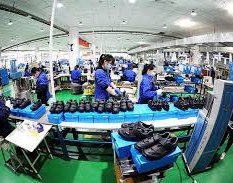According to the Ministry of Commerce 2021, China’s export of shoes and boots was US$47.9 billion, a year-on-year increase of 35%. The supply chain of the footwear industry chain has shown strong resilience. [China Exports of Footwear (customs) - January 2022 Data – Trading Economics/CLIA]
Fujian is the largest province in terms of footwear exports. The pandemic caused a significant decline in 2020, but Fujian’s footwear exports steadily recovered, and exports have exceeded the pre-pandemic level.
In 2021, Fujian Province exported a total of 2.49 billion pairs of footwear products worth 79.77 billion yuan, an increase of 22.6% and 26.3% year-on-year, and an increase of 3.5% and 2.9% respectively compared with 2019.
Guangdong, the second largest export province for shoes and boots, also saw a recovery trend. Chengzhan Shoes Co., Ltd., established in 2006, mainly produces international brand sports shoes, golf shoes, casual shoes and hiking shoes. It has more than 5,000 employees. The company’s orders recovered steadily in 2021, up about 15% compared to 2020. However, there is still a 5% catch-up gap compared to 2019. In 2022, the goal is to produce 7 million pairs of shoes and the current production schedule is full until June.
The performance changes in the Chengzhan Footwear Industry in recent years are also a microcosm of Guangdong footwear export and foreign trade enterprises in general. Guangzhou Customs reports that in 2021, Guangdong exported 67.81 billion yuan of shoes and boots, a year-on-year increase of 14.1%. The number of shoe and boot companies with export business in seven cities (Guangzhou, Foshan, Qingyuan, Zhaoqing, Heyuan, Shaoguan, Yunfu). Customs area has also increased from 1225 in 2020 to 1423 in 2021. Ten years ago the number was just 491.
Orders may be sufficient, but many companies are troubled. The rising cost of raw materials, labor and social security, international logistics costs, financing costs, etc. are generally reflecting difficulties. The main raw material prices have risen by 30%, but customers place orders at the past prices, which brings great pressure on the company. At the same time, due to the shortage of containers and the impact of the epidemic, many finished products could not be shipped, and a lot of cash flow was needed to support them.
The shortage of labor has further increased the cost burden. Due to the local spread of the epidemic, many workers are reluctant to go out to work after returning to their hometowns, resulting in a long-term lack of employees and most companies have generally used salary increases to stabilize their jobs. For example in Putian, footwear companies have raised wages by 8% to 15%, which has stabilized some workers, but there is still about a 20% shortage of workers.
Guo Jing, chairman of Youth Home (Fujian) Sporting Goods Co., Ltd., said that with the shortage of labor and the rise of various raw materials, the cost of a pair of shoes will increase by at least 10%.
In the face of changes in the external environment, companies and experts say that transformation and upgrading is the only way out for traditional foreign trade export companies such as footwear. Equal emphasis on internal and external markets and balanced development will be an effective way.
Chen Wenbiao, president of the Putian Footwear Association, said that the current overseas epidemic prevention and control situation is unclear, and international brands generally arrange orders in a three-year cycle, so international orders are relatively stable during this period. Foreign trade shoe companies should take advantage of this window to vigorously develop both domestic and international markets to achieve balanced development inside and outside.



